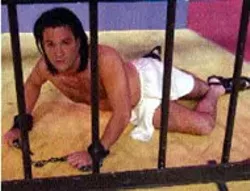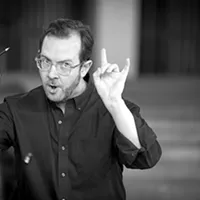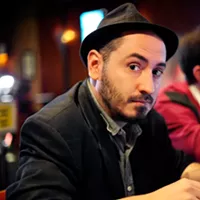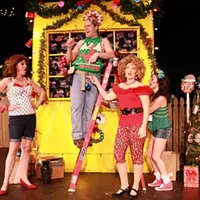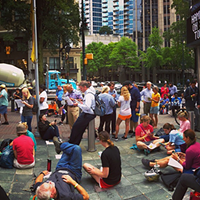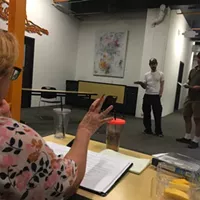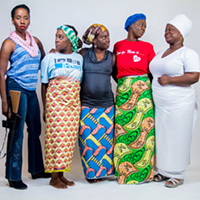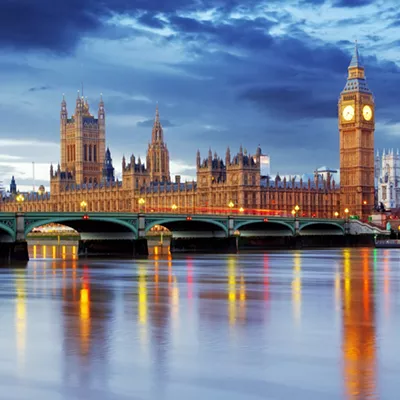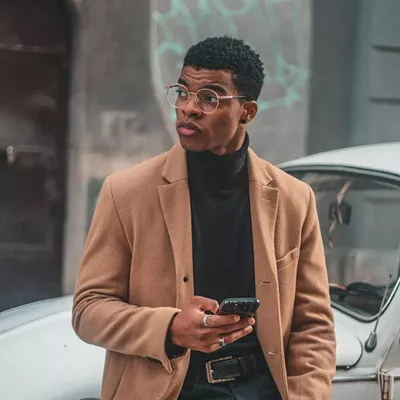Page 2 of 3
As expected, Steve Bryan is a hoot as Pharaoh, and the brothers, spearheaded by Patrick Ratchford as Ruben, are a winsome ensemble. The only disappointment was Rachelle Howell's self-conscious Narrator, straining to hit the high notes and becoming unintelligible when she did.
As Joseph, Kevin Jayroe simply blows away any memory you might have of his Charlotte predecessors -- teen idol Tommy Page at CP or Sam Whats-his-name on tour at Ovens. Jayroe sings, dances, and acts better than either of them, and his bare torso had my wife unabashedly drooling.
On my third go-round with The Baltimore Waltz, I'm beginning to get the hang of Paula Vogel's cockeyed tribute to her dead brother. Partial thanks go to Off-Tryon Theatre Company artistic director Glenn Griffin, who imposes a ritualized presentation upon the picaresque story and inserts a phantasmagorical interlude between our protagonist's fantasy and her rocky landing back in the reality of AIDS.
Onstage, Sheila Snow deserves equal credit, discarding her customary sexy smirk in favor of a dowdy diffidence that makes Vogel's surrogate, elementary school teacher Anna, seem suddenly plausible in her epic fantasy. Jimmy Chrismon, as the lively sib, and Patrick Hurley, in multiple cameos, provide superb support. Extra boosts come from John Hartness' lighting and Anthony Proctor's projection design.
Last Friday night, the universe was stood on its head at Supersonic, an oddly titled Charlotte Symphony Orchestra concert. Two guest artists, young conductor William Eddins and world-renowned clarinetist Richard Stoltzman, came in and performed a mostly 20th century program. And the Charlotte audience adored it!
The opener, Ralph Vaughan Williams' Fantasia on a Theme by Tallis (1910), delivered a foretaste of the sweetness and the razzle-dazzle to come. Built like a middle linebacker, Eddins strode onto the Belk Theater stage and cued the strings-only ensemble without a baton, conducting with only his beefy hands. It looked as if he'd brought a covey of guest musicians with him for, clustered behind the downstage strings, there was a little octet that replicated the main ensemble in miniature. As it turned out, these were all third-stringers plucked from the orchestra to form a separate antiphonal group.
A hushed, almost sacramental aura wafted softly through the hall as the piece began atmospherically. Cellos predominated as the theme crystallized, supplanted by the violins when the intensity notched upwards. Now the octet played against the orchestra before moving into the spotlight alone.
Fascinating, spiritual nourishment. Beautiful solos followed from within the main ensemble from violist Alice Kavadlo, concertmaster Jinny Leem, cellist Alan Black, and violinist Wolfgang Roth.
Fantasia ended as flawlessly as it began, shuttling between grand oceanic swells and hushed, churchly interludes that sounded like meditative organ music. See, modern classical compositions needn't be terrifying!
Next the CSO marched boldly into Handel's Music for the Royal Fireworks (1749) and nearly conquered. The overture unfolded impressively with the larger orchestra sounding looser and energized. Then a barrage of terrific brass, the trumpets sounding every bit as strong as the French horns. No, wait a second. The trumpets were sounding stronger -- steadier than the normally trusty horns.
That superiority carried over throughout the remainder of the five sections. It was as if the trumpets had been clamoring to play this music all through the McCoppin Era (the piece was last performed with Leo Driehuys in 1993), warming up with it at every rehearsal, while the French horns -- and the other winds -- had never seen the music before last Friday's performance. Luckily, after horns and winds had done their worst, the brass had the last triumphant word with powerful volleys of percussion.
With Stoltzman playing John Corigliano's Clarinet Concerto after intermission, many modernity-resistant subscribers discreetly sought the exits. Too bad for them. They missed an extraordinary 20-minute tutorial and demo prior to the performance, cooked up by Stoltzman and Eddins to sell the audience on the music. Since Stoltzman had to arrange a powwow with Corigliano to gain permission to play his concerto, you can say that he has an inside track to the inspiration and intent of the 1977 composition.
Stoltzman and Eddins obviously imparted the essence to the musicians as effectively as they did to the Charlotte audience. CSO accompanied spectacularly. Horns, clarinets, pocket trumpets, and percussion were deployed out in the rear of the house, all the way up to the rafters, for the concluding antiphonal toccata. Two conductors were required to execute this theatrical extravaganza -- David Tang sat mysteriously in the middle of the orchestra without an instrument until he suddenly rose majestically to summon the surround-sound fireworks.
Speaking of Arts_performance.html
-

Sailing With Hamlet
Jul 20, 2005 -
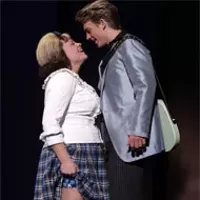
Proud To Be Plump
Jul 6, 2005 -
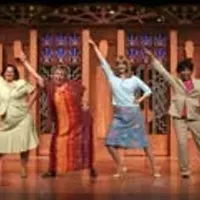
Putting The Sell In Cellulite
Jun 29, 2005 - More »
Latest in Performing Arts
More by Perry Tannenbaum
Calendar
-
 RuPaul's Drag Race Werq The World Tour 2025 @ Ovens Auditorium
RuPaul's Drag Race Werq The World Tour 2025 @ Ovens Auditorium -
 Boulet Brothers Dragula: Season 666 Tour @ N.C. Music Factory
Boulet Brothers Dragula: Season 666 Tour @ N.C. Music Factory -
 Jim Norton @ The Underground
Jim Norton @ The Underground -

Trap & Paint + Music Bingo @ Blush CLT
-
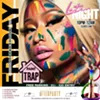
Trap & Paint (Hookah Edition) @ Blush CLT
-
The Mind of Matt Cosper
XOXO Steps Beyond the Threshold of Freaky Theater
-
Jezebel star has Bette Davis eyes, nothing else 3
Play follows custom of casting male in lead role
-
Marriage and Divorce, American Style
Charlotte Rep's invitation to Dinner

